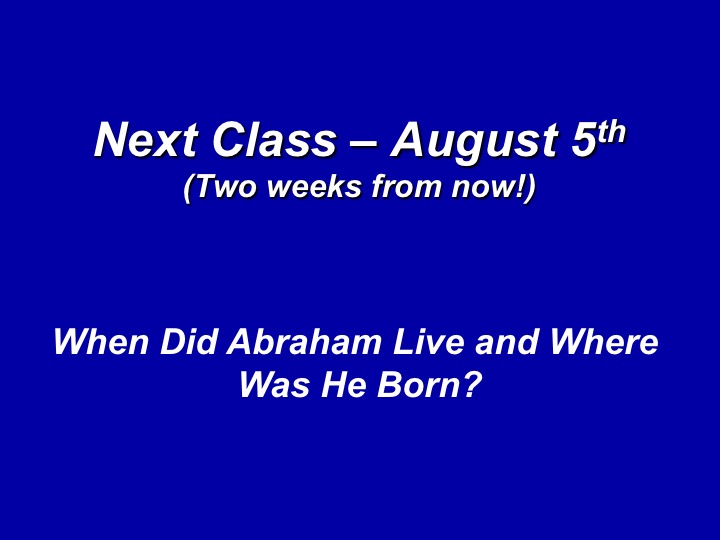Genesis Abraham Story
Genesis 12:22
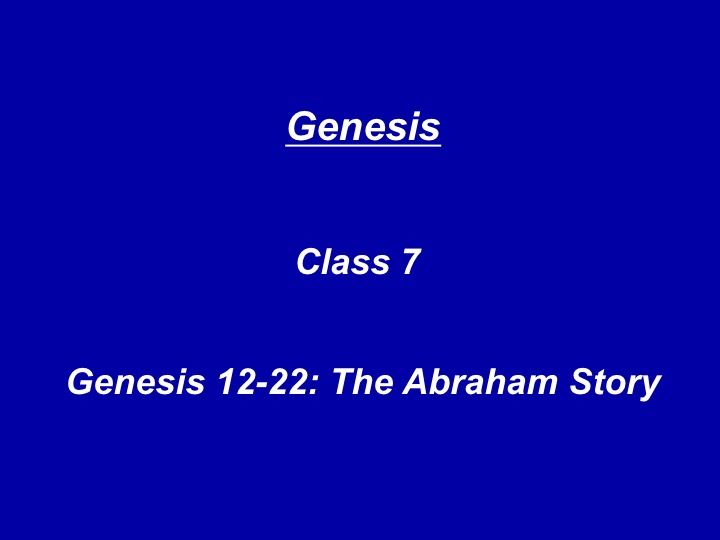
We are now going to turn to the great narrative of the people of Israel that begins with Abraham.
Abraham is introduced at the end of chapter 11, and there is additional material about his life in chapters 23-25, but the main core of the Abraham story is chapters 12-22, bounded by the first and last times that God speaks to Abraham (12: 1-3 and 22: 16-18). This class presents an overview of the narrative, focusing on the interrelated themes of God's granting the land of Canaan to Abraham and Abraham's quest for an heir. We will see how Lot, Eliezer, Ishmael, and Isaac are all candidates for this role, but how the story eliminates the first three, one after another, thereby leaving only Isaac as the true heir.
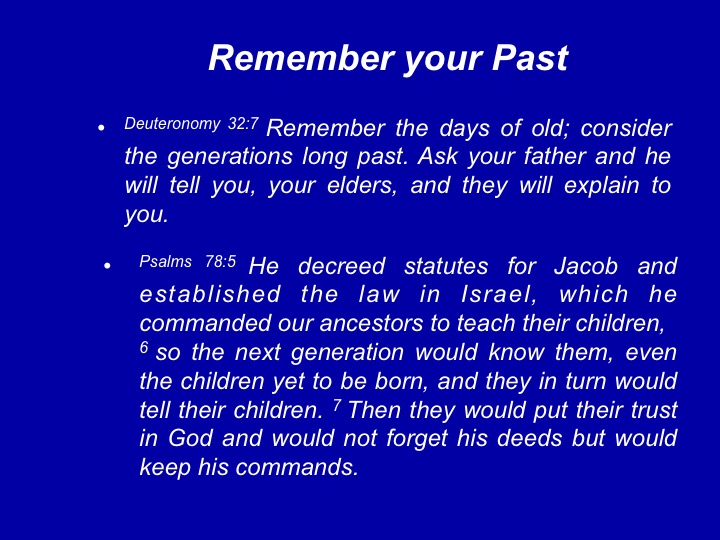
We are now beginning to read history. The ancient Israelites understood God as a deity who reveals himself in history. This is unique among world religions.
Statements in Deuteronomy 32:7 and Psalms 78:5-6 command the people to recall their history.
It is no surprise, then, that the biblical books developed as they did, especially the great narrative that commences with Genesis and continues through Kings, presenting the entire history of Israel from Abraham through the destruction of Jerusalem in 586 B.C.
That history begins with the personality of Abraham, and it is to his story, which commences at the end of Genesis 11 and the beginning of Genesis 12, to which we now turn.
Abraham is introduced at the end of chapter 11, and there is
additional material about his life in chapters 23-25, but the main core of the
Abraham story is chapters 12-22, bounded by the first and last times that God
speaks to Abraham (12: 1-3 and 22: 16-18).
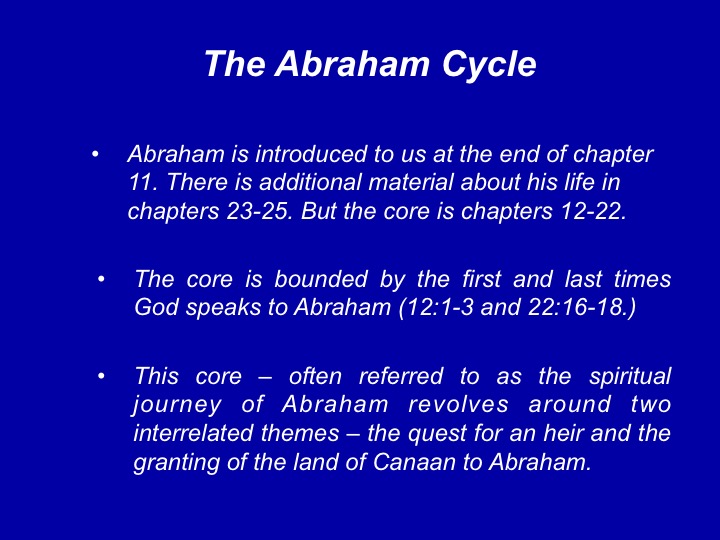
Abraham is introduced at the end of chapter 11, and there is additional material about his life in chapters 23-25, but the main core of the Abraham story is chapters 12-22, bounded by the first and last times that God speaks to Abraham (12: 1-3 and 22: 16-18). That is what we will cover today.
Since we obviously cannot read 10 chapters aloud in 40 minutes we will instead present an overview of the narrative, focusing on two interrelated themes - God's granting the land of Canaan to Abraham and Abraham's quest for an heir. Those two themes are tied together with the notion of a covenant. And the idea of covenant is the core teaching of the Abraham cycle.
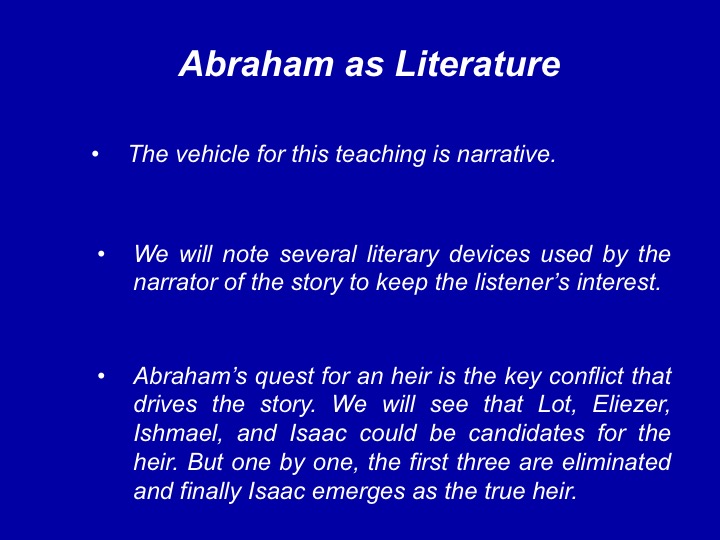
As we have mentioned multiple times this summer – Genesis – which is teaching important truths about the relationship between God and Israel – is doing it through the vehicle of literary narrative. It is not a true history book, as we moderns define a history book. And it is not a systematic theological treatise. But it enables the listener to learn both some history and the key theological truths by revealing both through narrative – interesting stories.
And again – the culture of the ancient near east was an oral/aural culture – from the mouth to the ear. The narratives were read aloud to a predominately illiterate population. And for the average listener each narrative – such as this story of Abraham may have only been heard a few times in their lives. This type of literary experience placed great responsibility on the listener to listen closely and great responsibility on the writer and reader to keep the listener’s attention. So as we go we will be noting several literary devices developed by the very skillful narrator to keep the listener’s interest throughout this lengthy story.
All literature, right up into modern times, is driven by conflict. Conflict is always introduced into stories, then intensified, until finally a resolution is reached. The conflict creates drama, and drama holds the listener’s interest.
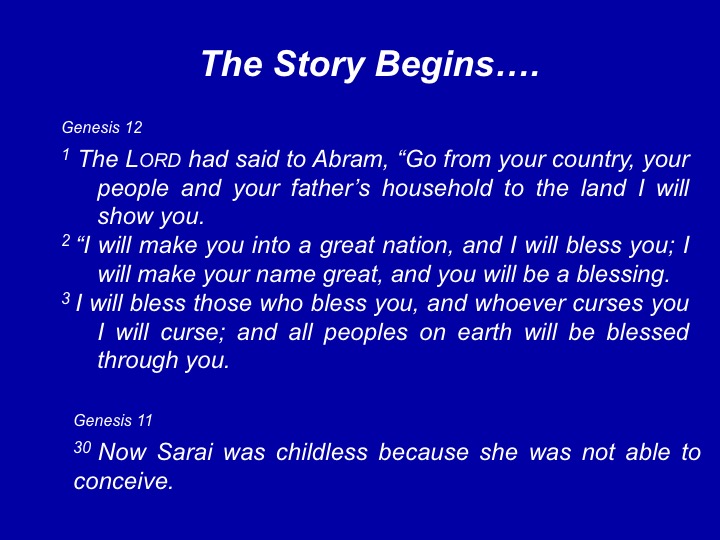
We begin at the beginning of Genesis 12.
A few things to note; Abraham is at this point is called Abram (and his wife is Sarai). In chapter 17 his name is changed to Abraham and hers to Sarah.
Note also that the narration wastes no words. We don’t anything about this man called Abram at this time. All of a sudden God speaks to him.
Note also that no big deal is made of that fact that God talks to a man. No explanation for why. It is obvious that to the people of ancient Israel there was no need for an explanation. God speaks to humans of His choosing. He has for example already done this with Noah.
Now remember that great literature begins with conflict. The conflict is already obvious to the listener. Why – because the listener has just heard the last part of chapter 11, in which the family of Terah, Abram’s father, is defined. And in the listing of Terah’s family tree, it mentions that one of the sons was named Abram, and that he was married to Sarai. And verse 30 says: “30 Now Sarai was childless because she was unable to conceive.”
So the listener immediately sees a conflict and wants to read on – how ill this be resolved. How does a promise from on high jive with the facts on the ground?
So the reader reads on…
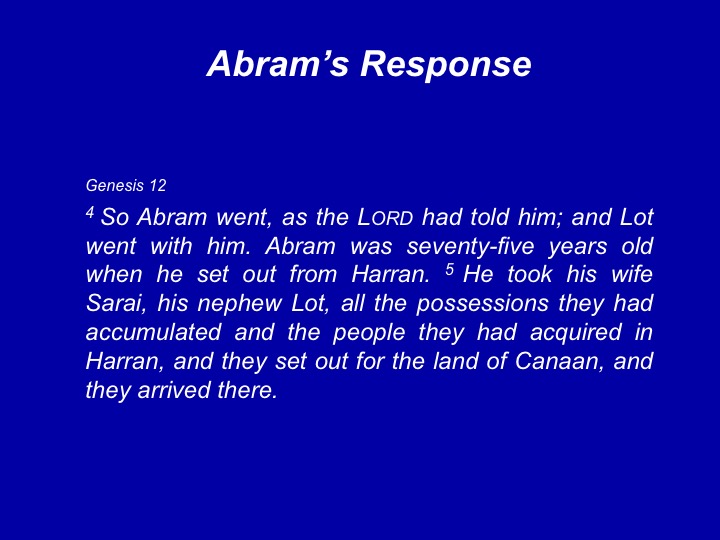
A couple of comments here. Verb placement is very important in the Hebrew language. So Jewish scholars take note of the fact that first Abram went – and then in verse 5 he took his wife, his nephew, and all of the people and possessions he had acquired while living in Harran. In other words he had to pack up for this big family move.
Note also the emphasis on Lot, a nephew. Abram obviously took a large contingent with him – but only Lot is mentioned. Why this emphasis on Lot. Well, as we will learn in our next lesson when we examine some of the legal documents from northern Mesopotamia - it was not uncommon for childless men to adopt a family member as their heir. Childless men in this culture were somewhat obsessed with naming one or heirs – often by adoption.
So the listener in ancient Israel would begin to wonder – is this how the conflict will resolved? Will Lot create the family Abraham was promised? Maybe that’s the answer.
But just when we think that could be the answer – that answer is taken away from us. Because in the very next chapter – Genesis 13 - Abram and Lot have a parting of the ways. Because each have large flocks of sheep and apparently water is scarce – quarrelling breaks out and Abram finally suggests that since we are both from the same family – let’s separate to avoid conflict – you go your way and I will go in another direction. So Lot is apparently not the answer to the conflict – he exits stage right – and the stage is now back to Abram and Sarai – but Sarai is still barren. The drama increases......
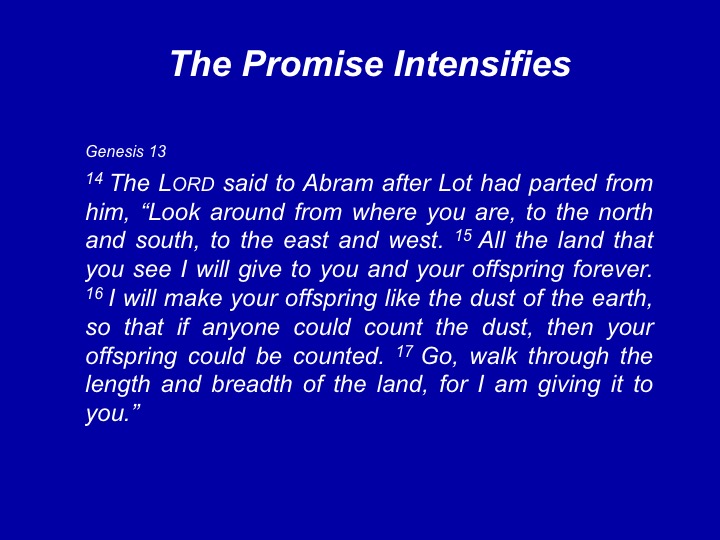
So – like all great literature – the conflict intensifies. And it intensifies in two ways:
First - Lot has been eliminated as a solution.
Second the promise itself has increased greatly. Before it was just you will be a great nation, and have innumerable offspring.
But now - in addition all of this land will be yours.
And the conflict still exists – Abraham still has no heirs. And he is getting older.
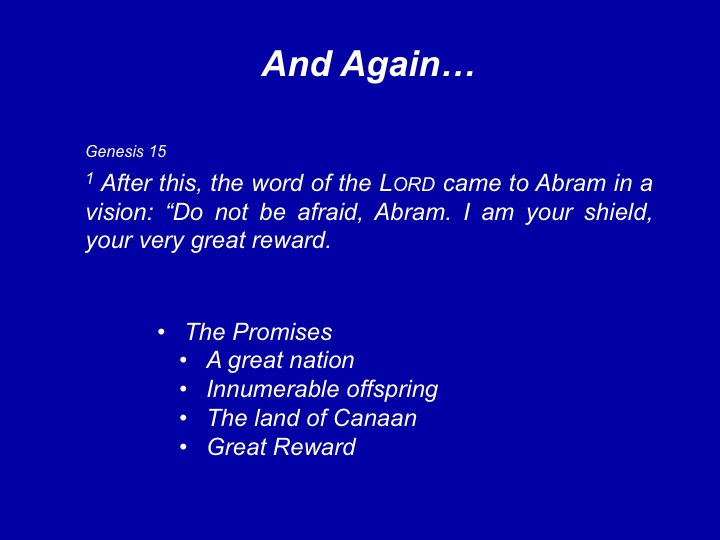
And yet another promise – the fourth one by this time.
Let’s review the growing promise list.
The conflict still exists – Abraham has no heirs. Sarai is still barren.
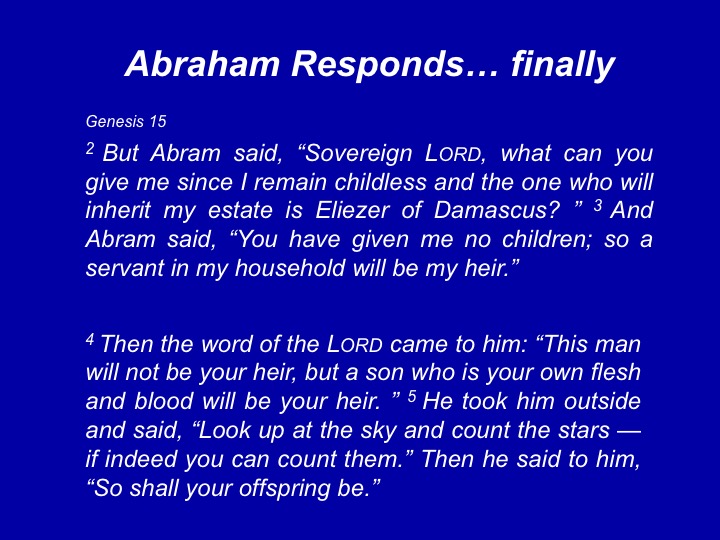
It is interesting to note that until now Abram has been mute when God talks – and God has talked to him several times.
But finally Abram gets the gumption as it were – and says wait a minute, God.
So who is this Eliezer person – and why does Abram think he will inherit his estate and be his heir? In our next class we will learn about the multiple adoption documents found in northern Mesopotamia thru excavations. And we will learn that childless men often adopted at least one servant as a possible heir. Why? – in this culture it was extremely important for a man to have a son. First the family genealogy must continue, second - an elderly man must have a son to take care of him, and third – a man’s son has the responsibility of proper burial of his father. So it was common as an insurance policy to adopt a family member or a servant just in case. These adoption contracts always stated that in case a birth son came along later then the birth son had precedence in inheritance.
And now the reader sees an answer to the conflict – Eliezer will be the heir. Right ?- - no wrong!.
In the very next verse that is taken away from the reader (or listener).
“This man will not be your heir”. And you can almost see the finger of God pointing at Eliezer when he says that. Not this man but a son who is you own flesh and blood will be your heir. So all of these thoughts about possible adoptees is banished. There will be a birth son. Then to make matters worse the promise is then escalated again. Count the stars if you can – so shall your offspring be.
And Sarai is still barren.
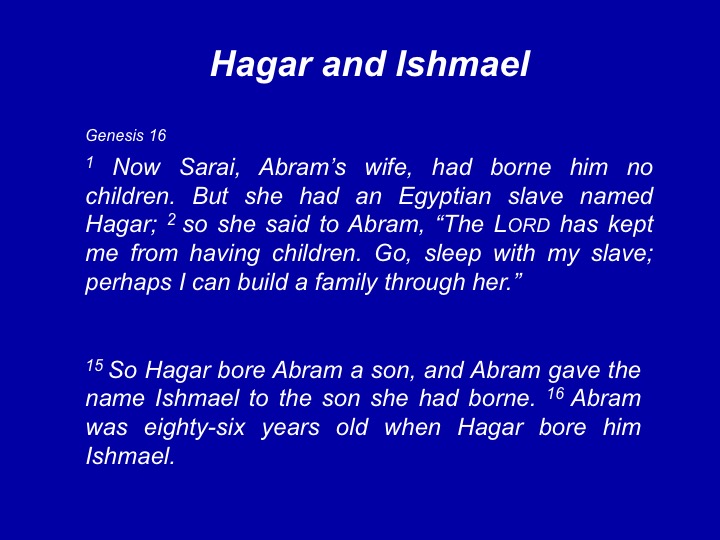
And suddenly – a possible breakthrough.
Again – the modern reader may not understand what just happened. Did Sarai just do a noble thing? And is Abram just a jerk?
Actually we again have to understand ancient near east culture. And again in our next class we will learn from the documents that have been uncovered from northern Mesopotamia from this time period – Sarai was simply fulfilling her legal requirements – as spelled out in numerous marriage contracts we have found. When a wife is unable to deliver a son in a timely manner – she is required to provide her husband with one of her handmaidens to fulfill that obligation. It's a rule.
And we will note when reading this entire chapter – Sarai took the initiative – there is no indication that Abram requested this.
So – problem solved and conflict resolved. Ishmael must be the answer to the dilemma of how to have a great nation.
No not really…
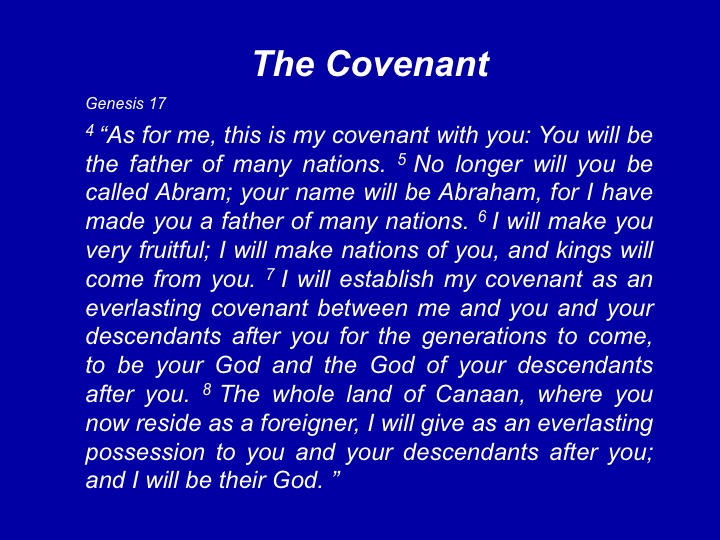
Here we see a complete
elaboration of the covenant between God and Abraham. It was alluded to earlier in chapter 15 but
here it is spelled out.
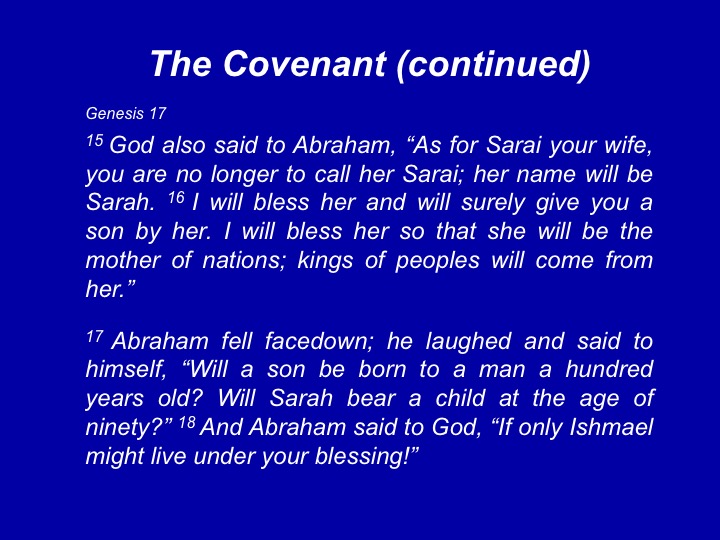
And it continues. And to the readers surprise God makes it very clear to Abraham. Your barren wife Sarah will have a son – and she will thus be the mother of nations – kings will come from her.
And what was Abraham’s reaction. Disbelief – can Sarah have a wife at age ninety? And then he essentially says – you have already fulfilled your promise – what about Ishmael?
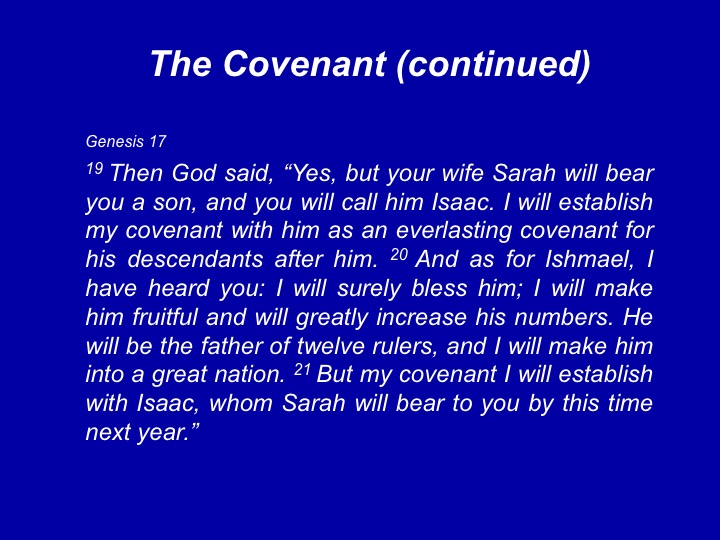
And now – we finally come to a resolution to the conflict. Although Isaac has not yet appeared – God has explained to Abraham how the original promise of a great nation will eventually happen.
The covenant then is the real answer to the original conflict. The covenant and the promise of a seed is absolutely essential to the story of God’s relationship to the people of Israel. And it is the essential message of the story of Abraham that we have read. Once again we are told – God makes promises and God delivers on those promises.
And although we have not been emphasizing it today – this Abraham cycle is structured in a chiastic fashion – just as the flood story was. And with the covenant we have reached the resting place of the cycle – where the central message is conveyed.
Now interestingly we are at chapter 17 and Isaac is actually not born until chapter 21. In the intervening chapters several more episodes in Abraham’s life are introduced and told and the reader has to wait with bated breath until Isaac is actually born to Sarah. In that same chapter Hagar and Ismael are sent away because the stage is a little crowded with Abraham having too many wives and sons. And it now appears we are all set up for a happy ending with just Abraham, Sarah and Isaac their new son. And we should be seeing something like – “and they lived happily ever after.”
Ah – but that is not the way that literature works. How many times have we read an entertaining novel in which we have read perhaps 350 pages of a 400 page novel and it seems that all of the conflicts have been resolved and we begin to wonder - what else could happen in these last 50 pages? Then the author springs one last surprise on us.
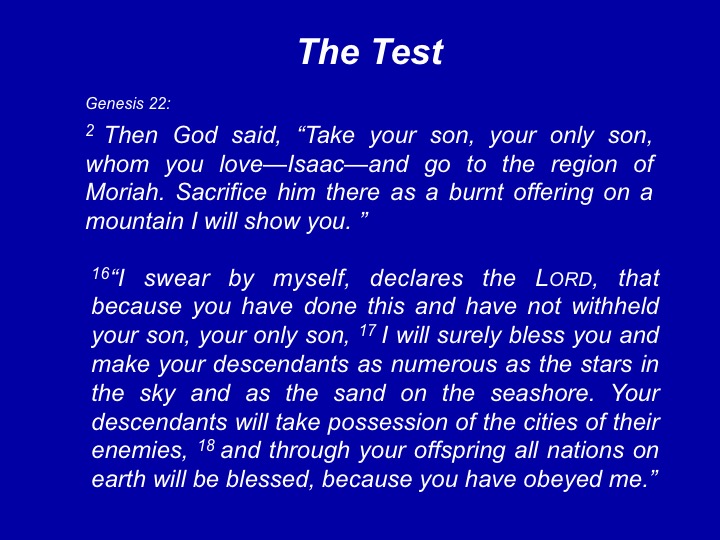
And after all this has happened chapter 22 opens with this command from God to Abraham.
And the reader says “What? We have finally after all of this time identified the seed – Isaac – and Abraham has to sacrifice him?
Well – as we know – this never happens because just as Abraham is about to do everything God commands him to do – as Abraham always does – just as Abraham raises his hand and we see the knife in the air over Isaac –who is bound on top of the wood of an altar an angel of the Lord says “Abraham” and Abraham replies “Here I am” and the angel says “Do not lay a hand on the boy.” And Isaac is spared.
And at the end of that chapter we then see the end of the Abraham cycle when God says to Abraham beginning in verse 16:
And note a literary device here. The narrator purposely tells us something that is not really true. Isaac is not Abraham’s only son – what about Ishmael? But the narrator wants the very poignant story of the binding of Isaac to have the highest possible drama so he says your only son – that you love to emphasize it. Literature has it’s own requirements – it sometimes makes statements to heighten the tension of a story. And the reader knows that Isaac is not the only son. And Genesis knows this because in chapter 25 which describes the death and burial of Abraham both Ishmael and Isaac show up to do their family duty and bury their father.
This is the last time in Genesis that God speaks to Abraham – and it echoes the words that God used all the way back in Genesis 12: 1-3 where he says that all nations on earth will be blessed because of you. So the entire cycle has come full circle – closing the chiastic structure.
The story of Abraham is a literary classic – keeping the reader totally engaged in order to convey an important truth about the relationship of God to the people of Israel – and that important truth is the covenant between God and Israel and the carrier of the seed of Abraham – Isaac.
I might mention here that the God also kept his promise to Abraham about Ishmael – Ishmael did become the father of 12 rulers.
